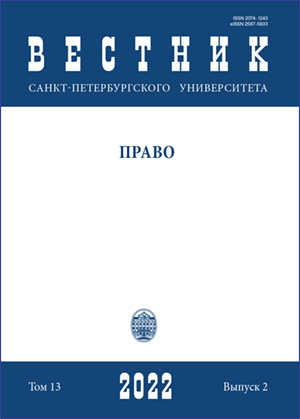The legal nature making amends and compensation for the damage caused by the crime under Russian and German law
DOI:
https://doi.org/10.21638/spbu14.2022.212Abstract
The article examines the legal nature of complex intersectoral legal institutions for making amends and compensating for the damage caused by a crime under Russian and German law and reveals their content. The author’s definition of a complex intersectoral institution is given, and an algorithm for solving in case of a conflict of legal norms of various branches of law is proposed. Making amends for the damage caused by a crime, being the broadest form of voluntary compensation for harm in Russian law, is considered in comparison with a similar German legal institution — compensation for the damage caused to the victim by a person who has committed a criminal offense, which is also a form of voluntary compensation for harm. Both institutions contribute to the voluntary resolution of a criminal-legal conflict resulting from the commission of a criminal offense, and allow taking into account the real needs of the victim. Despite the presence of common principles in Russian and German criminal processes: both belong to the Romano-Germanic (continental) legal family, are based on the principle of legality, the functioning of such institutions as amending and compensation for the damage caused by a crime testifies to different models of justice in Russian and German criminal proceedings. Legal regulation and the construction of making amends for the damage caused by a crime reflect the general punitive direction of the Russian criminal proceedings. At the same time, legal regulation and the established practice of applying compensation for damage caused to the victim mean the introduction of the principle of expediency and an element of restorative justice into the German criminal process. Taking into account the German experience of compensation for the damage, proposals were made to improve the Russian institution of making amends for the damage caused by a crime.
Keywords:
making amends for the damage, compensation for harm, victim, intersectoral legal institution, voluntariness of compensation for harm, restorative model of criminal justice
Downloads
References
Downloads
Published
How to Cite
Issue
Section
License
Articles of "Vestnik of Saint Petersburg University. Law" are open access distributed under the terms of the License Agreement with Saint Petersburg State University, which permits to the authors unrestricted distribution and self-archiving free of charge.






